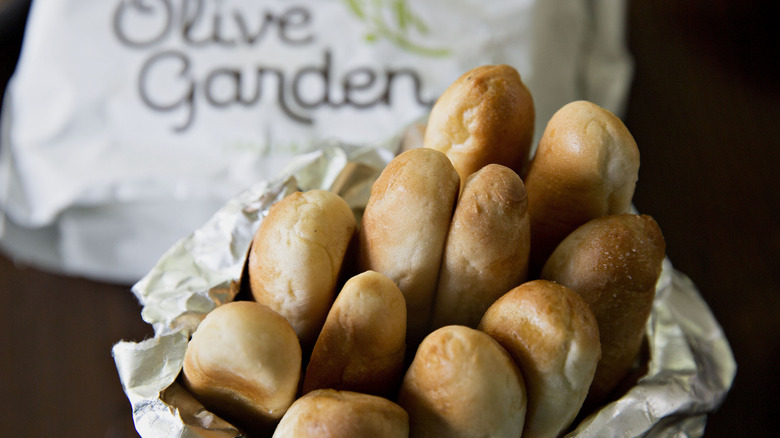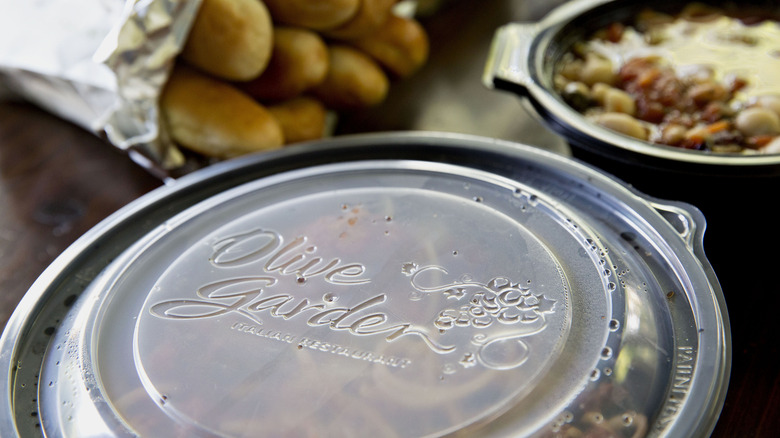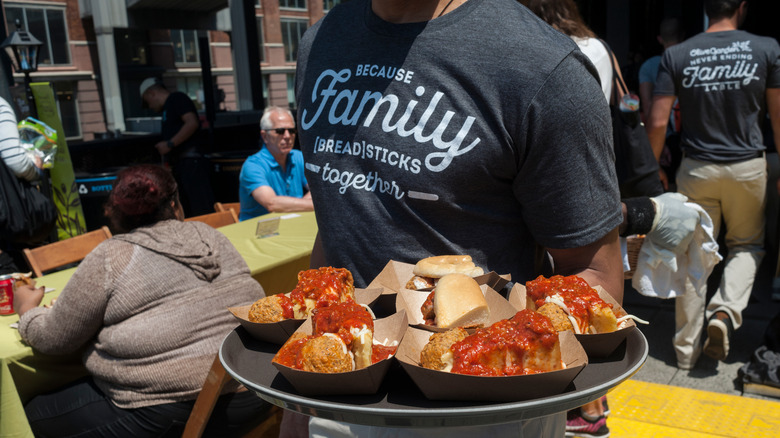How Olive Garden Came Back From The Brink Of Financial Ruin
In 2013, Olive Garden wasn't doing well. The chain restaurant of the Darden Restaurants group is known for Italian-ish dishes that make diners feel like family — or, at least, put them in a carb coma with unlimited breadsticks. But when the activist hedge fund Starboard Value gained a controlling interest in 2014, Olive Garden's breadsticks came under scrutiny.
Starboard made a number of changes to Olive Garden's operations. It streamlined the operations in the back of house and reduced wait time by implementing tableside tablets, allowing for faster table turnover by an average of seven minutes. It rolled out online to-go orders, leading to higher checks than phone orders. The wine got better and more expensive, and waitstaff pushed more alcohol orders — even offering 50% off a glass for diners waiting for a table. The menu got tighter, ditching tapas and hamburgers and doubling down on its Italian dishes. It raised prices on staples like never-ending pasta. As for the breadsticks: Give fewer, but make them better. By 2016, stock in the company raised by 47% and year-over-year sales increased for at least six straight quarters. Olive Garden continued to see increases in profit year-over-year until 2020 where it, like many other restaurants, took a heavy hit.
More wine, better breadsticks, still no salted water
Starboard Value put executives into the fray at Olive Garden — every board member worked in the restaurants waiting tables and greeting customers. They talked to employees about what was getting in the way of them doing their jobs well. The biggest answer was inefficiency: Tables would be set ahead of time and then cleared, and kitchen staff was spending time portioning uncooked pasta and basil garnish cups.
There were food waste issues, too — the official policy to bring baskets of breadsticks equal to the number of people plus one and then only bring more when asked wasn't followed 57% of the time. This created cold, hard, unappetizing breadsticks if they weren't eaten right away and cost the company an estimated $4 to $5 million. Starboard wasn't interested in discontinuing the endless breadstick program, but it wanted to make sure the breadsticks didn't go bad on the table — and that diners didn't fill up on free bread in lieu of appetizers.
Starboard also found that Olive Garden was seriously missing out on booze revenue, with some of the lowest reported alcohol sales in the industry. Only 8% of its revenue came from alcohol sales, compared to 16.5% in similar-tiered Italian restaurants. Starboard revamped the wine program and sent top employees to Italy to study wine pairing. As for salting the pasta water, it was eventually convinced that the difference in taste wasn't worth nullifying the warranty on expensive pots.
A massive rebound
In 2013, Darden's shareholder letter began (via Yahoo! Finance), "Our financial performance in fiscal 2013 was certainly disappointing." Olive Garden brought in $3.68 billion that year. The CEO at the time, Clarence Otis, stepped down as Starboard took over, and COO Gene Lee took over. Darden sold their private jet and started putting executives on commercial flights. Shares rose by 15% in just two months and the company beat the market. By 2016, that number rose to $3.8 billion. In Q2 of 2016, Olive Garden made up 55% of Darden's total sales, and share prices were up 60% since the Starboard takeover.
Beyond reducing costs from labor to TV commercials to food, Starboard made it a priority to revamp the dining experience at Olive Garden. It changed policies around hiring part-time prep cooks, freeing up chefs to actually cook. It changed policies around understaffing and how many tables a server can handle at one time — previously just three — to reduce manufactured wait times. It focused on keeping things simple, which can be hard, as Lee said (per Food Business News) during a 2016 earnings call, but that's what was responsible for "the biggest lift in Olive Garden." Lee drove home the point that a better dining experience (and increased efficiencies) were to thank, saying Olive Garden was "winning every single day at the nine square feet."


